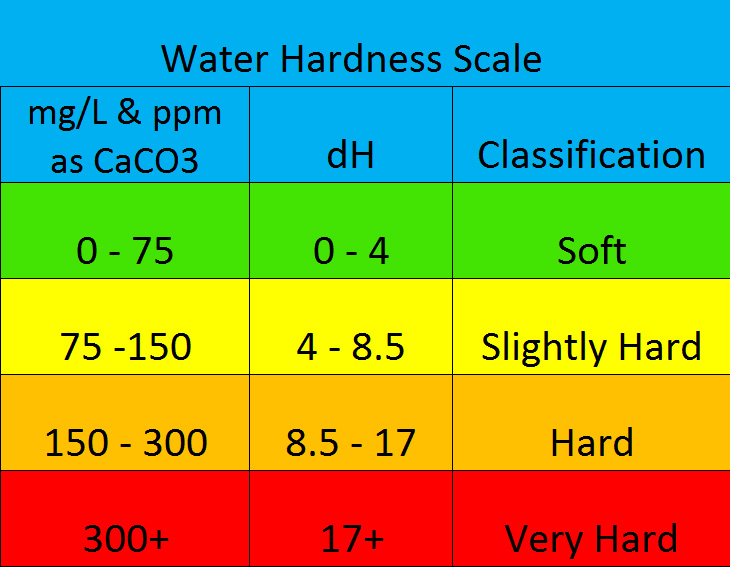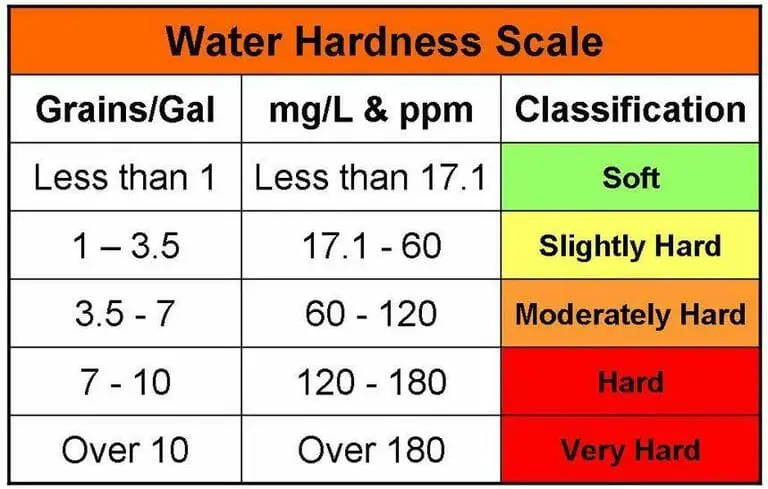Water Hardness Dh To Ppm
Water hardness is a term that describes the dissolved minerals in a body of water, with the most common minerals being calcium and magnesium. One of the ways this hardness is measured is in degrees of hardness (dh), but it can also be measured in parts per million (ppm). While water hardness may seem like a minor issue, it can cause a range of problems for households and businesses alike.
Many people do not realize the impact that water hardness can have on their daily lives. Hard water can cause scale buildup in pipes and appliances, which can lead to decreased efficiency and higher energy bills. It can also cause soap scum buildup in sinks and showers, leaving a difficult-to-remove film on surfaces. Additionally, hard water can make it difficult for soaps and detergents to lather, which can lead to the excessive use of cleaning products.
So, what is the target of water hardness dh to ppm? The target is to be able to convert degrees of hardness to parts per million, which is a more commonly used unit of measurement. This conversion allows for easier comparison of water hardness levels between regions and between different sources of water.
To summarize, understanding water hardness dh to ppm is important because it can help prevent issues caused by hard water. By converting degrees of hardness to parts per million, it becomes easier to compare water hardness levels and to make informed decisions about water treatment options.
Water Hardness dh to ppm and Its Impact on My Home
Growing up, my family lived in an area with very hard water. I vividly remember the build-up of scale in our showerhead and the difficulty of getting dishes to come clean with the water from our tap. It wasn't until later in life that I realized the impact of water hardness on our household appliances and energy bills. By measuring the water hardness dh to ppm, we were able to understand the severity of the problem and make informed decisions about water softening options.
Measuring Water Hardness dh to ppm
The easiest way to measure water hardness dh to ppm is by using a test kit or meter. These tools can provide a quick and accurate measurement of the dissolved minerals in the water. Additionally, many water treatment companies offer free water hardness testing as part of their services. Once you have a measurement in degrees of hardness, you can use a simple conversion formula to convert it to parts per million.
The Impact of Water Softeners on Water Hardness dh to ppm
Water softeners are a popular option for treating hard water. These devices work by removing the calcium and magnesium ions from the water and replacing them with sodium ions. While this can make the water feel "softer" and prevent scale buildup, it can also lead to increased sodium levels in the water. In areas with high sodium levels in the source water, this can be a concern for individuals on sodium-restricted diets.
Alternatives to Water Softeners for Treating Hard Water
There are a variety of alternative treatment options for hard water, including reverse osmosis systems, water conditioners, and magnetic water treatment devices. Each of these options has its own unique advantages and disadvantages, so it's important to do your research and choose the option that best fits your needs.
My Current Water Hardness dh to ppm and Treatment Plan
Currently, my water hardness measures at 12 degrees of hardness, which converts to 214 parts per million. While I'm not currently experiencing any major issues with hard water, I'm considering installing a magnetic water treatment device to prevent future issues with scale buildup and soap scum.
Question and Answer
What is considered a high water hardness level in ppm?
A water hardness level of 120 ppm or higher is considered to be high, and can cause issues with scale buildup and soap scum.
Can hard water cause health problems?
While hard water itself is not harmful to consume, high levels of dissolved minerals in drinking water can contribute to kidney stone formation in individuals with a history of kidney stones.
Do water softeners remove all minerals from water?
Water softeners remove calcium and magnesium ions from the water, but they do not remove all dissolved minerals. Additionally, they add sodium ions to the water as part of the softening process.
Can hard water cause damage to household appliances?
Yes, hard water can cause damage to appliances and reduce their efficiency over time due to scale buildup in pipes and sediment buildup in water heaters.
Conclusion of Water Hardness dh to ppm
Water hardness dh to ppm is an important concept to understand for anyone looking to maintain the efficiency and longevity of their household appliances. Whether you choose to install a water softener or explore alternative treatment options, being able to measure and understand water hardness levels can empower you to make informed decisions about your household water supply.
Gallery
Water Hardness - Serene Aquarium

Photo Credit by: bing.com / hardness serene
Colorkim | AQUAX®P Total Water Hardness Test Strips | Colorkim

Photo Credit by: bing.com / hardness strips total test water aquax
Liberty Lake Sewer And Water District Apr 1, 2018

Photo Credit by: bing.com /
How To Size A Water Softener For Your Home: A Quick Calculation

Photo Credit by: bing.com / hardness softener calcium purify magnesium moderately determining improper sizing
What Size Water Softener Do I Need? - WaterFilterGuru.com

Photo Credit by: bing.com / hardness softener measure